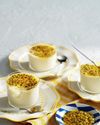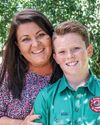
We all carry inside us people who came before, wrote American author Liam Callanan. And in every new family line, glimpses of the older can be seen. A grandfather’s lopsided smile reappears in a grandson. Three generations of women have the same violet-flecked eyes. For historian Rose Overberg, it’s chestnut-colored hair and distinctive height that she shares with her mother. “A lot of people say I look like Mum,” she says.
But while Rose has freckles and brown eyes, her mother has olive-toned skin and green eyes, and there are other features that can’t be accounted for. “Nobody in my family has my eyebrows,” she says.
For most of her life, Rose didn’t know who gave her those attributes, and she never thought much of it until she tried to find out and was blocked at every turn. Rose was conceived with the help of donor sperm in 1975, when the now-thriving fertility business was just a cottage industry without regulation or proper record keeping. Years later, when she tried to find out about her donor, she was shocked to learn that all evidence of her conception had disappeared.
And Rose was not alone. By the time the Victorian government made record-keeping mandatory in 1988, thousands of donor-conceived babies had been born. Many have files, but a significant number have not.
Rose describes herself as “pretty stubborn and self-righteous”, and she became determined to get to the bottom of this. “You’re creating a person and there are no medical records. How is that ethical?” she asks. “I don’t think they ever thought about the children. If the doctors had some foresight about our wellbeing, they’d have kept those records.”
هذه القصة مأخوذة من طبعة September 2020 من The Australian Women's Weekly.
ابدأ النسخة التجريبية المجانية من Magzter GOLD لمدة 7 أيام للوصول إلى آلاف القصص المتميزة المنسقة وأكثر من 9,000 مجلة وصحيفة.
بالفعل مشترك ? تسجيل الدخول
هذه القصة مأخوذة من طبعة September 2020 من The Australian Women's Weekly.
ابدأ النسخة التجريبية المجانية من Magzter GOLD لمدة 7 أيام للوصول إلى آلاف القصص المتميزة المنسقة وأكثر من 9,000 مجلة وصحيفة.
بالفعل مشترك? تسجيل الدخول

Maggie's kitchen
Maggie Beer's delicious veg patties - perfect for lunch, dinner or a snack - plus a simple nostalgic pudding with fresh passionfruit.

Reclaim your brain
Attention span short? Thoughts foggy? Memory full of gaps? Brigid Moss investigates the latest ways to sharpen your thinking.

The girls from Oz
Melbourne music teacher Judith Curphey challenged the patriarchy when she started Australia's first all-girls choir. Forty years later that bold vision has 6500 members, life-changing programs and a new branch of the sisterhood in Singapore.

One kid can change the world
In 2018, 10-year-old Jack Berne started A Fiver for a Farmer to raise funds for drought relief. He and mum Prue share what happened next.

AFTER THE WAVE
Twenty years ago, the Boxing Day tsunami tore across the Indian Ocean, shredding towns, villages and holiday resorts, and killing hundreds of thousands of people from Indonesia to Africa. Three Australians share their memories of terror, loss and survival with The Weekly.

PATRICIA KARVELAS How childhood tragedy shaped me
Patricia Karvelas hustled hard to chase her dreams, but it wasn't easy. In a deeply personal interview, the ABC host talks about family loss, finding love, battles fought and motherhood.

Ripe for the picking
Buy a kilo or two of fresh Australian apricots because they're at their peak sweetness now and take inspiration from our lush recipe ideas that showcase this divine stone fruit.

Your stars for 2025
The Weekly’s astrologer, Lilith Rocha, reveals what’s in store for your astrological sign in 2025. For your monthly horoscope, turn to page 192.

MEL SCHILLING Cancer made me look at myself differently'
One year on from going public with her bowel cancer diagnosis, Mel Schilling reveals where she's at with her health journey and how it's changed her irrevocably.

Nothing like this Dame Judi
A few weeks before her 90th birthday, the acting legend jumped on a phone call with The Weekly to talk about her extraordinary life – and what’s still to come.